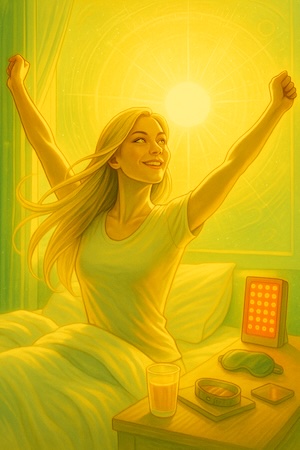
You know the drill. You sleep like trash for a week, finally get a real night of rest, and suddenly you're smiling at strangers like an idiot and remembering why you used to enjoy being alive.
That's what your body is supposed to feel like all the time — before stress, blue light, under-eating, and fake "hustle" culture wrecked your circadian rhythm.
Most people don't have sleep problems — they have metabolic dysfunction. And the deeper the suppression, the more broken your sleep becomes:
- You wake up at 2 a.m. wired and panicking.
- You sweat through your shirt at night but freeze during the day.
- You sleep 9 hours and still feel like a corpse.
If that's you? You don't need melatonin. You need to rebuild your system.
Why Most Sleep Advice Is Useless
Let's be honest:
"Avoid screens at night" isn't going to fix your cortisol.
"Take melatonin" won't do anything if your blood sugar crashes at 1 a.m.
And lavender spray doesn't stop your liver from dumping adrenaline while you sleep.
Sleep is a metabolic event — your body has to produce energy without food for 8 hours straight. If your system isn't stable, you wake up halfway through the job.
Here's What Actually Helps:
1. Eat before bed
If you're waking up at 1–3 a.m., you likely have low glycogen and your body is dumping stress hormones to compensate. A small snack (like warm milk + honey + pinch of salt) can stabilize blood sugar and help your liver do its job while you sleep.
2. Stop pushing through the crash
You know that afternoon dip? It's your circadian rhythm begging for rest. A 20–30 min nap resets cortisol, improves learning, reduces inflammation, and doesn't "ruin your sleep".
Wolves nap. Burnt-out humans don't.
3. Salt your food
Low sodium = low aldosterone = poor blood pressure regulation = sleep disturbances. Stop eating like a clean-eating monk and give your adrenals what they need.
4. Quit intermittent fasting
Skipping breakfast throws off your circadian rhythm and puts your body in a stress state all day. That same cortisol spike that kept you "focused" at noon is the reason you're up at 3 a.m. with heart palpitations.
5. Regulate light like a predator, not prey
- Morning: 10–15 min outside within 30 min of waking = melatonin later.
- Night: Red light, lamp light, no overheads = natural wind-down.
It's all about telling your brain what time it is. Your suprachiasmatic nucleus (SCN) runs on light cues.
Sleep Is When You Heal or… Don't
Your body doesn't fix itself while you sleep.
It fixes itself if your system is safe enough to allow repair.
If you're underfed, overtrained, and stressed out — your body uses sleep to survive, not rebuild.
If you want to feel 20 years younger, stop treating sleep like a luxury and start treating it like the metabolic reset button that it is.
I go deeper into all of this — including how sleep impacts hormone repair, skin, bile flow, even memory formation — in my upcoming book.
